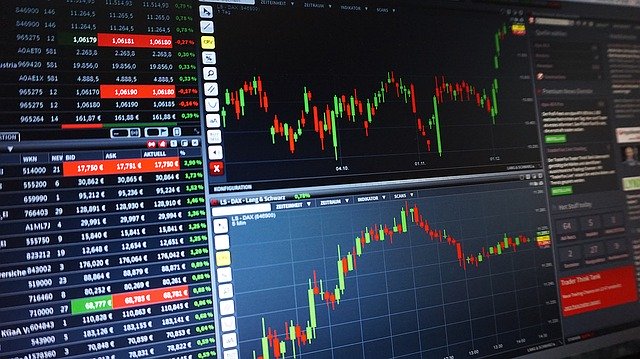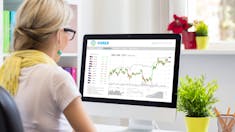Forex Scalping: A Strategy Guide (2026)
All products and services featured are independently selected by WikiJob. When you register or purchase through links on this page, we may earn a commission.
- A list of the Top Brokers for Forex Scalping for January 2026:
- Description of the Best Brokers for Forex Scalping for January 2026
- What Is Forex Scalping?
- Is Forex Scalping Right for You?
- What Are the Different Scalping Methods?
- Quick Glance: The Pros and Cons of Scalping
empty
empty
- How to Scalp in Forex: Where to Start
empty
empty
empty
empty
- Frequently Asked Questions
- Final Thoughts
This article provides an introduction to the basics of forex scalping.
There is a wealth of information out there on the intricacies of scalping. This article aims to provide a simple overview to make it accessible to new traders.
Your research should be necessarily supplemented by more specific and detailed explorations of the different options, strategies and methods for progressing with forex scalping.
A list of the Top Brokers for Forex Scalping for January 2026:
Description of the Best Brokers for Forex Scalping for January 2026
1. Pepperstone
Founded in 2010, Pepperstone has been quick to adapt to the social copy trading trend, providing plenty of tools for traders to share and mimic trading styles.
Traders can opt for payments via PayPal, which will be processed instantly.
With over 1,200 instruments, it offers two account types:
- Standard – The Standard account comes with market average spreads and zero commission
- Razor – This account operates on a commission basis but with exceptionally low spreads
Pepperstone currently does not offer its platform in the UK, but offers the complete MT4, MT5, cTrader and TradingView solutions.
2. XTB
As a broker that you can trust, XTB is both well-regulated and listed on the stock exchange. The registered office is in Canary Wharf, London.
XTB offers investors and traders the opportunity to trade commodities, stocks, metals, forex, indices and cryptocurrencies, as well as ETFs and CFDs, and it is regulated in top-tier jurisdictions by FCA, CySEC, IFSEC and KNF.
Traders can easily open an account online and can choose between the commission-free Standard account or the Pro account that includes tighter spreads, but there is a commission that needs to be paid on all trades.
Deciding what platform to use to make your trades depends on your location – in most countries, you can choose MetaTrader 4 or the proprietary platform xStation (although MT4 is not available to UK customers).
XTB is a great choice for beginners thanks to the huge range of educational materials, categorized by level (beginner, intermediate and advanced) and the customer service options that are available only on weekdays.
There is a fully functional demo account so beginners can practice strategies and get used to using the platforms.
The more experienced trader will enjoy a huge range of research resources, including trading signals, technical analysis, details about different instruments, and even a heat map and market sentiments.
CFDs are complex instruments and come with a high risk of losing money rapidly due to leverage. 69-80% of retail investor accounts lose money when trading CFDs with this provider. You should consider whether you understand how CFDs work and whether you can afford to take the high risk of losing your money.
3. IG
IG is a great share trading platform for beginners thanks to its user-friendly interface and extensive educational resources.
Pros of IG include a wide range of trading instruments and markets, as well as the ability to access multiple account types and trading platforms. The platform also offers a demo account for beginners to practise trading strategies before investing real money.
However, IG isn’t the cheapest share trading platform, with relatively high trading fees and a minimum deposit requirement of £250 when paying by credit/debit card or PayPal.
In terms of additional fees, IG charges a commission fee for share trading, starting from £8 per trade. There’s also a custody fee of 0.25% per year for holdings of £250 or more.
Overall, IG is a solid choice for beginners looking for a user-friendly platform with extensive educational resources, but investors should be aware of its fees and minimum deposit requirements.
4. Moneta Markets
Moneta Markets was launched in 2009 to create a brokerage that allows fast and simple access to the markets.
Regulated by both ASIC and the FCA, this is considered to be a safe broker that you can trust, whether you are a beginner trader or a professional.
With a minimum deposit of $50, traders can buy and sell commodities, indices and CFDs in shares and cryptocurrency. 45 forex pairs are available for trading too.
The STP Account is probably the best choice for beginners, with no commission on trades but fees built into the trade. The True ECN account has tighter spreads but you will pay a round turn commission of about $6 per lot, so this is probably more effective for an experienced trader.
Alongside a functional demo account, there is a Moneta Masters course that will help investors that are just starting to learn, through a series of 144 videos.
In terms of research, alongside the usual market sentiments, economic calendars and other resources, Moneta TV is a YouTube channel dedicated to all things trading that provides useful information for beginner and experienced traders.
Although the True ECN account has costly commission charges. Moneta Markets is a great broker for all types of trading.

What Is Forex Scalping?
In the forex (FX) market, ‘scalping’ refers to the skimming of small individual profits from a large number of trades. Profit is made through buying and selling currencies across a short time frame using real-time analysis.
Note: The forex market is the market where traders can buy, sell, exchange and speculate on currencies.
Though similar to day trading, which involves opening and closing a position during the same trading session, scalping is more intense as it involves making multiple trades during a single session.
Scalpers trade to one-minute, five-minute and tick charts, aiming to catch high-velocity movements to make profits. For comparison, day traders tend to use fifteen and thirty-minute charts.
Note: A tick is a measure for the minimum movement in the price of a security, whether upward or downward.
Those who trade in this rapid way aim to scalp between 5 to 10 pips from each of their trades.
Note: A pip is the smallest exchange price movement that can occur between a currency pair and stands for ‘percentage in point’.
The average value of a pip is approximately $10 for each standard lot. This means that the process needs to be repeated multiple times throughout the day to result in a substantial profit.
Note: In forex trading, a standard lot is equivalent to 100,000 units of the base currency.
Scalpers aim to make the most of even small currency fluctuations, squeezing a few pips of profit out of each trade. Currency pairs can, however, fluctuate by up to 10 to 20 pips over 24 hours. As a scalper, however, you would not expect to gain more than 10 pips per trade or lose more than 7 pips.
Scalping often involves using high leverage to maximise the pips of profit gained. This strategy can amplify profits, but also losses.
Note: Leverage refers to the use of borrowed funds to increase your trading position.
Is Forex Scalping Right for You?
The forex market is the most liquid and volatile trading market. Consequently, scalping requires intense concentration and an ability to remain calm when exposed to pressured situations and risk.
To make a profit from scalping, you will need to make fast judgements and act accordingly. It is not suited to those who wish to carefully analyse their movements as it relies on making snap decisions in the moment to make profits within minutes.
As trades must be rapid and regular, scalping involves large portions of time sitting in front of a computer waiting for the right trades. A strong attention span and a knack for following charts are crucial. You will also need a fast and reliable internet connection.
For pip gains to be substantial, scalpers trade with high volumes. This means that scalping is only really a viable trading option if you have access to a large deposit.
Whether scalping is suitable for you will also depend on your availability and the amount of time you have to commit to trading. To scalp successfully, you will need to constantly analyse the forex market.
As mentioned previously, you will also be required to be available to make multiple trades throughout each session.
The best time for scalping is determined by the market, so scalpers need to have the flexibility to be available to trade in these hours.
What Are the Different Scalping Methods?
Scalping can be done via manual or automated means:
-
To scalp manually, a scalper must sit in front of their computer watching market movements to ascertain when they should be choosing and adjusting their positions. A manual scalper must constantly look for signals and interpret whether to buy or sell each time.
-
An automated system is less time consuming and labour intensive. A scalper can set a specifically chosen strategy algorithm for a computer program to carry out automatically. The software will look for the same signals the manual scalper watches for and will automatically interpret them.
Quick Glance: The Pros and Cons of Scalping
Cons
-
Scalping is risky – In a volatile market, trading moves need to be made without time to think. To make the largest profit from small trades, scalpers do not tend to follow the 2% risk management rule (that you should not risk more than 2% of your account balance per trade). This tendency can make scalping riskier than other forms of trading such as day or swing trading.
-
It is time-consuming – Scalping requires dedication and an interesting balance of patience and spontaneity. Intense concentration is a necessity.
-
Scalping requires a large deposit – To make the most from small, rapid trades, scalpers need to be able to freely access funds.
Pros
-
Trades are conducted rapidly – Rapid trades may make scalping less stressful than other types of trading. As the position isn’t held for long, there isn’t time for stress to build, only adrenaline.
-
Profits can be small, but are scalable through repetition – Profits on each trade can be small but the speed of trades and repetition can make scalping very profitable.
-
Scalping requires less knowledge of trading – Engaging in scalping has a smaller learning curve than many other forms of trading. This means that it may be suitable for those who are new to trading, as little background knowledge is required to make profitable trades.

How to Scalp in Forex: Where to Start
1. Currencies, Sessions and Volatility
As a scalper, you should only trade the major currencies, where liquidity is highest. The major – and most tradable – currencies are:
- U.S. Dollar (USD)
- European Euro (EUR)
- Japanese Yen (JPY)
- British Pound (GBP)
- Swiss Franc (CHF)
- Canadian Dollar (CAD)
- Australian/New Zealand Dollar (AUD/NZD)
- South African Rand (ZAR)
The best chance of gaining pips comes from selecting a volatile currency pair so you are presented with multiple opportunities to make trades. The most volatile pairs tend to be:
- EUR/USD
- GBP/USD
- EUR/JPY
- GBP/JPY
The overlapping of trading sessions, coupled with the fact that currency pairs tend to contain currencies from different regions, gives these pairs volatility spikes.
The three main sessions are:
- The London session
- Asia-Pacific session
- North-American session
It follows that European currencies and the currency pairs that include them are most volatile during the London session. Other currencies spike in volatility during their respective regional sessions, so the best times to trade will depend on your location and the currencies you wish to trade.
London/New York and London/Japan have the heaviest overlaps and therefore see the most trading activity.
If you are after high market volatility, then trade at the same times of day as institutional traders such as banks and funds when volume is high. This tends to be in the morning, often following monetary policy announcements and other relevant news.
Start with Pepperstone – Our Favorite Broker
2. The Spread and Transaction Costs
Whilst high volatility presents opportunities for a higher number of moves, volatility isn’t the only factor scalpers should consider.
When scalping, you are also looking for a currency pair that could provide the lowest possible spread (for example, is cheap to trade). Instead of charging a fee to make a trade, this cost is built into the buy and sell price of the currency you are trading.
Note: The spread is the difference, in pips, between the bid and the ask price; the bid price being the price at which you can sell the base currency and the ask price being the price at which you can buy it.
Spreads can be fixed or variable. Fixed spreads remain the same regardless of market conditions. Technically, trading with fixed spreads is better for scalpers as widened spreads can rapidly diminish profits. However, STP and ECN brokers (the topic of brokers is elaborated upon later) are unable to fix spreads. Whilst Dealing Desk (DD) brokers – or ‘market makers’ – offer fixed spreads, they tend to hinder if not prohibit scalping.
Before scalping, you should have an understanding of how the spread relates to your transaction costs. To calculate this, you need to know the spread, the value per pip and the number of lots you are trading (position size).
To calculate the transaction cost, multiply the value per pip by the spread multiplied by the number of lots being traded (standard lot, mini lot or micro lot).
Transaction (or spread) cost = (spread x position size) x pip cost (dependent on lot size being used)
As an example, for currency pairs with USD, fixed pip amounts are:
- $10 for a standard lot, which is 100,000 units of currency
- $1 for a mini lot, which is 10,000 units of currency
- $0.10 for a micro lot, which is 1,000 units of currency
It is important to know your pip value so you can calculate the ideal position size for a trade. Irrespective of the currency the account you are trading with is funded in, if that currency is listed second in a currency pair, the pip values are fixed.
Calculating pip values for different currencies can be confusing, so be sure to research and practice until you are comfortable that you can work out the pip value and transaction cost. This will help to ensure your trades are set to be profitable.
Bear in mind that as you increase your position size, your transaction cost will also increase as it is reflected in the spread. The spread will end up being approximately 10% to 30% of your income so finding the lowest value possible is an important consideration.
Picking a currency pair that has both a good level of volatility and favourable trading conditions is crucial to success as a scalper.
3. Timeframes and Charts
It is important to determine the appropriate chart for use in your trading.
When scalping, working within one and five-minute time frames is most common. Using a fifteen-minute time frame for scalping currency pairs is less popular as this results in taking fewer positions per day.
Gains and losses are impacted by timeframes, with a five-minute scalp often offering a gain of more pips than a one-minute timeframe.
Scalpers should start by looking at a week’s pricing data to establish a short-term market direction. This enables the identification of trends. Inserting trendlines and using moving averages will help with this.
Note: A trendline is a line drawn over pivot highs or under pivot lows to reveal the prevailing price direction and speed. A moving average is used to smooth and filter out noise from short-term price fluctuations. The most commonly used moving averages are the simple moving average (SMA) and the exponential moving average (EMA).
From these identified trends, an execution chart (displaying a selected timeframe) is used to choose your positions.
Ultimately, the timeframe and charts you choose will depend on how many positions you want to take in a day. For three to five positions, a five-minute chart is recommended; whereas, for more than five trades, a one-minute chart would be best suited.
Once you begin trading, you will soon find the timeframe that suits you best.
4. Brokers
For scalping, you will need a No Dealing Desk (NDD) broker which offers Straight Through Processing (STP) or Electronic Communication Network (ECN) execution, or hybrid STP & ECN execution.
NDD brokers use STP and ECN technology without a dealing desk, which allows faster access to the market and prevents ‘market-making’ (where brokers take the opposite side of trades). If using a scalping strategy, you should avoid market-making FX brokers.
Both STP and ECN trading systems are computerised which helps to reduce human error. The main difference between STP and ECN brokers relates to the routing of trades:
STP Brokers:
- STP brokers send all orders with their account through to their liquidity providers. These are often hedge funds, banks and prime brokers. These liquidity providers comprise an internal liquidity pool and compete for the best bid/ask spreads for the orders received.
- STP brokers provide Direct Market Access (DMA), as client orders are passed directly to their liquidity pool with only a small mark-up spread from the broker. They cannot offer fixed spreads because they choose the best spread for each order.
- STP brokers allow you to trade small lots, which means that they are suitable for inexperienced or new traders with smaller budgets.
ECN Brokers:
- ECN brokers send trades into the Electronic Communications Network, which is effectively a hub that streams quotes from hundreds of liquidity providers. The ECN aggregates quotes to show the best bid and offer.
- ECN trading tends to be capped at a 0.1 minimum lot size because few liquidity providers allow for trades with less than this. For traders who wish to trade with smaller amounts of money, this can be inhibiting.
Hybrid STP & ECN brokers provide a balance, offering both channels, whilst still avoiding market-making.
What to Look for in a Broker:
- It is best to choose a broker with the most variable spreads. Brokers with variable spread can offer the best possible spread as they can select the best bid and ask from the liquidity providers in their pool.
- Different brokers offer access to different online trading platforms. It is important to become completely comfortable using the platform so that you can quickly action your decisions and avoid potentially costly mistakes.
- To avoid slippage – where a trade is executed a few pips away from the intended level – and the extra cost/loss it can incur, check the trading terms of your broker to ensure that you understand any limitations they may have on their execution guarantees. As a scalper, you must be confident that your trade will be executed at the order level requested.
- Finally, it goes without saying, but always seek a reputable broker with a license. If your broker is not regulated, your money may not be secure. FCA UK (the Financial Conduct Authority) is the top regulator in Europe.
When seeking further information on brokers, be aware that many articles out there are written by the brokers themselves. This means the stance taken on which type of broker is the best choice heavily depends upon the broker’s own business template, so be aware of bias and misleading advice.
Forex scalping is a trading strategy where a trader opens and closes positions within seconds or minutes to make small profits. It is a fast-paced and high-volume approach that aims to capitalize on small price movements.
The best forex broker for scalping is one that offers low spreads, fast execution and no requotes. Some brokers also offer specific accounts tailored for scalping strategies.
Some of the popular brokers for scalping include IC Markets, Pepperstone and FXTM.
Forex scalping is difficult because it requires a high level of precision, discipline and risk management. The trader needs to make quick decisions and have a deep understanding of the market dynamics to make profitable trades consistently.
To set up scalping in forex, a trader needs to have a reliable internet connection, a fast trading platform and access to low-latency market data.
They also need to choose a suitable currency pair, set appropriate stop-loss and take-profit levels, and apply technical analysis indicators.
Forex scalpers typically use short time frames, such as 1 minute, 5 minutes or 15 minutes. This allows them to identify and capitalize on small price movements and execute trades quickly.
Forex scalping differs from other trading strategies in terms of its focus on small price movements and quick trades. Unlike long-term strategies, scalping does not require extensive analysis of economic or political factors.
The benefits of using a forex scalping strategy include the ability to generate quick profits, lower exposure to market volatility and reduced risk of holding positions overnight.
It also allows traders to take advantage of high trading volume and liquidity in the forex market.
Forex scalping is not recommended for beginner traders as it requires a high level of experience, discipline and risk management skills.
It can also be stressful and overwhelming, leading to emotional decision-making and losses.
Forex scalpers use a range of technical analysis indicators such as moving averages, Bollinger bands and RSI.
They also use advanced tools such as Level II pricing data, tick charts and order flow indicators to identify market trends and make profitable trades.
The risks and challenges of forex scalping include high trading costs, high frequency of trades and psychological pressure.
Scalping can also be affected by market volatility, slippage and liquidity issues, which can lead to losses.
Forex scalping is legal, but some brokers have restrictions on the use of scalping strategies. Traders should check the broker's terms and conditions before engaging in scalping.
Some tips for successful forex scalping include using a reliable broker, keeping a trading journal, setting realistic profit targets and practicing good risk management. It's also important to stay disciplined and avoid emotional decision-making.
Final Thoughts
When scalping, it is important to have realistic profit expectations and to keep your emotions in check. Successful scalping requires a calm disposition and quick mental and physical reflexes.
If you find yourself feeling stressed or over-excited by the process, it may be a good time to take a break. Use quiet trading times as an opportunity to step away from the computer and trading process so you can return to the trading platform refreshed.
It is also a good idea to focus on one market so you do not feel overwhelmed and get adequate rest.
Scalping requires lots of liquidity to ensure trades can be executed quickly. Ensure you are in the right financial situation to be able to scalp and, as with all trading, never invest more than you can afford to lose.
Take time to research and choose the right broker for you – reputability should be a priority as you are trusting them with your money.
Ultimately, for the best chance of success as a scalper, scalp pairs with high volatility and the smallest possible spread.
WikiJob does not provide tax, investment or financial services and advice. The information is being presented without consideration of the investment objectives, risk tolerance or financial circumstances of any specific investor and might not be suitable for all investors. Past performance is not indicative of future results. Investing involves risk including the possible loss of principal.








